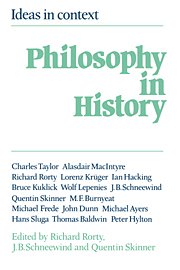Book contents
- Frontmatter
- Contents
- Dedication
- Preface
- Notes on contributors
- Introduction
- PART I
- 1 Philosophy and its history
- 2 The relationship of philosophy to its past
- 3 The historiography of philosophy: four genres
- 4 Why do we study the history of philosophy?
- 5 Five parables
- 6 Seven thinkers and how they grew: Descartes, Spinoza, Leibniz; Locke, Berkeley, Hume; Kant
- 7 ‘Interesting questions’ in the history of philosophy and elsewhere
- 8 The Divine Corporation and the history of ethics
- 9 The idea of negative liberty: philosophical and historical perspectives
- PART II
- Index
2 - The relationship of philosophy to its past
Published online by Cambridge University Press: 03 December 2009
- Frontmatter
- Contents
- Dedication
- Preface
- Notes on contributors
- Introduction
- PART I
- 1 Philosophy and its history
- 2 The relationship of philosophy to its past
- 3 The historiography of philosophy: four genres
- 4 Why do we study the history of philosophy?
- 5 Five parables
- 6 Seven thinkers and how they grew: Descartes, Spinoza, Leibniz; Locke, Berkeley, Hume; Kant
- 7 ‘Interesting questions’ in the history of philosophy and elsewhere
- 8 The Divine Corporation and the history of ethics
- 9 The idea of negative liberty: philosophical and historical perspectives
- PART II
- Index
Summary
It is all too easy to imprison oneself within the following dilemma. Either we read the philosophies of the past so as to make them relevant to our contemporary problems and enterprises, transmuting them as far as possible into what they would have been if they were part of present-day philosophy, and minimizing or ignoring or even on occasion misrepresenting that which refuses such transmutation because it is inextricably bound up with that in the past which makes it radically different from present-day philosophy; or instead we take great care to read them in their own terms, carefully preserving their idiosyncratic and specific character, so that they cannot emerge into the present except as a set of museum pieces. The power of this dilemma can be measured by the extent to which, even although its very formulation is enough to arouse a large dissatisfaction with either alternative, we nonetheless in practice do so very often succumb to one or the other. That we do so is certainly a consequence of both the number and the importance of the different ways in which we may be separated or distanced from past stages in the history of philosophy.
Consider first of all the effect of changes in the academic division of labour. We now characteristically distinguish philosophical problems and enquiries from scientific or historical or theological problems and enquiries; but it has not always been so.
- Type
- Chapter
- Information
- Philosophy in HistoryEssays in the Historiography of Philosophy, pp. 31 - 48Publisher: Cambridge University PressPrint publication year: 1984
- 16
- Cited by



